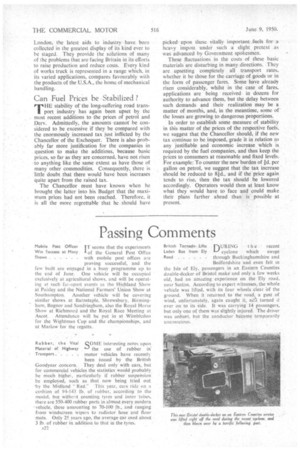Can Fuel Prices be Stabilized ?
Page 24

If you've noticed an error in this article please click here to report it so we can fix it.
Irr HE stability of the long-suffering road trans ' port industry has again been upset by the most recent additions to the prices of petrol and Derv. Admittedly, the amounts cannot be considered to be excessive if they be compared with the enormously increased tax just inflicted by the Chancellor of the Exchequer. There is also probably far more justification for the companies in question to make the additions, because basic prices, so far as they are concerned, have not risen to anything like the same extent as have those of many other commodities. Consequently, there is little doubt that there would have been increases quite apart from the raised tax.
The Chancellor must have known when he brought the latter into his Budget that the maximum prices had not been reached. Therefore, it is all the more regrettable that he should have picked upon these vitally important f-uels for a heavy impost under such a slight pretext as was advanced by Government spokesmen.
These fluctuations in the costs of these basic materials are disturbing in many directions. They are upsetting completely all transport rates, whether it be those for the carriage of goods or in the form of passenger fares. Some have already risen considerably, whilst in the case of fares. applications are being received in dozens for authority to advance them, but the delay between such demands and their realization may be a matter of month's, and, in the meantime, some of the losses are growing to dangerous proportions.
In order to establish some measure of stability in this matter of the prices of the respective fuels, we suggest that the Chancellor should, if the new tax continue to be imposed, grade it in relation to any justifiable and economic increase which is required by the fuel companies, and thus keep the prices to consumers at reasonable and fixed levels. For example: To counter the new burden of id. per gallon on petrol, we suggest that the tax increase should be reduced to 8id., and if the price again tends to rise., then the tax should be lowered accordingly. Operators would then at least know what they would have to 'face and could make their plans farther ahead than is possible at present.
















































































